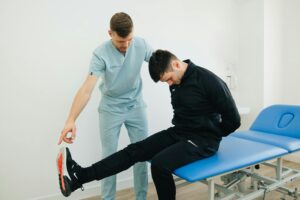Key Pointers:
- Frozen shoulder (adhesive capsulitis) causes pain and stiffness that limit arm movement.
- It often develops gradually and can last for months if untreated.
- Early physiotherapy and guided treatment help restore flexibility and prevent long-term stiffness.
What Is a Frozen Shoulder?
Frozen shoulder, or adhesive capsulitis, is a condition where the shoulder joint capsule becomes thickened and tight. The tissues surrounding the shoulder joint gradually stiffen, making it painful and difficult to move the arm.
This condition typically progresses through stages and may take several months to fully recover if left untreated.
Common Symptoms
Frozen shoulder often starts slowly and worsens over time.
Typical symptoms include:
- Shoulder stiffness that limits arm movement (especially when reaching overhead or behind the back)
- Dull or aching pain in the shoulder and upper arm
- Pain that worsens at night or during certain activities
Many people notice that even simple actions, such as dressing or combing hair, become difficult.
What Are the Causes and Risk Factors
The exact cause isn’t always clear, but frozen shoulder can occur after:
- Injury or surgery – where the arm is immobilised for a period
- Medical conditions – such as diabetes or thyroid disorders
- Inflammation – affecting the shoulder capsule
- Age and gender – most common between ages 40–60 and more frequent in women
How Frozen Shoulder Develops: The Three Phases
- Freezing Phase (Painful Stage)
The shoulder becomes increasingly painful and stiff. Movement becomes limited. - Frozen Phase (Stiff Stage)
Pain may improve slightly, but stiffness remains and limits function. - Thawing Phase (Recovery Stage)
Movement gradually improves as inflammation subsides and the shoulder loosens.
Diagnosis
Your orthopaedic specialist will examine shoulder movement and may order imaging tests such as X-rays or MRI to rule out other conditions like rotator cuff tears or arthritis.
Treatment Options for Frozen Shoulder
Most frozen shoulders improve with non-surgical treatment, although recovery can take several months.
1. Medications
Pain relief and anti-inflammatory medication may help reduce discomfort and swelling.
2. Physiotherapy
A structured physiotherapy programme is the mainstay of treatment. Gentle stretching and range-of-motion exercises help restore mobility and reduce stiffness.
3. Corticosteroid Injections
Injections into the joint can relieve inflammation and pain, making physiotherapy more effective.
4. Hydrodilatation (Joint Distension)
This involves injecting fluid into the joint capsule to gently stretch and loosen it.
5. Surgery (If Conservative Care Fails)
In persistent cases, a procedure called arthroscopic capsular release may be recommended to free up the tightened capsule and restore motion.
Expected Recovery Timeline
Recovery varies from person to person, but most patients improve within 6 to 12 months with consistent physiotherapy and follow-up care.
After surgery, patients usually resume light activities within weeks, with continued rehabilitation for best results.
When to See a Doctor
You should consult an orthopaedic specialist if:
- Shoulder stiffness or pain lasts more than a few weeks
- You struggle to lift your arm or perform daily tasks
- Pain disrupts sleep or worsens despite rest
Early intervention can help shorten recovery time and reduce the risk of long-term stiffness.
Frequently Asked Questions (FAQ)
1. Can a frozen shoulder heal on its own?
In some cases, it may improve gradually, but recovery often takes much longer without treatment. Physiotherapy helps speed up recovery and restore motion safely.
2. Is frozen shoulder the same as rotator cuff injury?
No. Frozen shoulder affects the joint capsule, while a rotator cuff injury involves the tendons around the shoulder. Both cause pain but require different treatments.
3. What exercises are safe for frozen shoulder?
Gentle stretching, pendulum swings, and wall-climbing movements are usually safe—but they should be guided by a physiotherapist to avoid aggravating pain.
4. Can frozen shoulder recur?
It usually affects one shoulder at a time, but in some cases, it may occur in the opposite shoulder later. Maintaining mobility exercises helps reduce the risk.
5. How soon can I resume normal activities after surgery?
Light activities can typically resume after a few weeks, but full recovery may take several months of physiotherapy and gradual strengthening.
Book a Consultation
If you’re experiencing shoulder stiffness or pain that limits your movement, schedule a consultation with our orthopaedic specialist to discuss your treatment options.
Farrer Park Medical Centre, #07-14 Connexion, Singapore 217562
+65 6518 9545
Message us for an appointment













